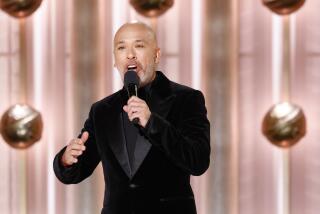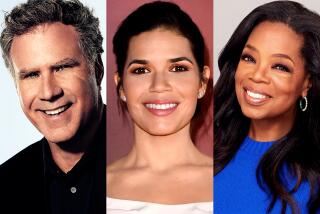Legal battle spins around the Globes
The Golden Globes awards are over, but a battle for the show’s future is just starting.
The Hollywood Foreign Press Assn., which created and owns the Golden Globes, is going to war with Dick Clark Productions, the longtime producer of the Globes’ television show.
At issue is a 2010 deal that Dick Clark Productions made with NBC to keep the Golden Globes on the network through 2018. That deal, worth about $150 million, was to go into effect starting with this year’s show. The ink was barely dry on the contract when the Hollywood Foreign Press Assn. filed a lawsuit charging that Dick Clark Productions violated the partnership by signing the new contract without the organization’s approval.
The HFPA charges that the NBC pact, which it believes to be a sweetheart deal, is evidence of Dick Clark Productions’ plans to steal control of the glitzy awards ceremony. The HFPA has also accused Dick Clark Productions of doing secret deals with sponsors and keeping the revenue for itself, as well as trying to exploit digital and other ancillary rights of the show without permission.
Next Tuesday, the two sides are scheduled to air the disagreement before a judge in a federal court in Los Angeles. Among the prominent figures expected to be on the witness list for the non-jury hearing are HFPA Chairman Philip Berk, Dick Clark, Chief Executive Mark Shapiro and former NBC business affairs chief Marc Graboff, who negotiated the TV deal on the network’s behalf.
If the HFPA wins, the NBC contract could be voided and the rights shopped to other networks that might jump to have the now-hot awards show. Indeed, CBS Corp. Chief Executive Leslie Moonves may even be called as a witness and asked what his network would pay for the Golden Globes if given the chance.
Because the contract never went into effect, NBC cut a one-year deal to carry Sunday’s show for $14 million. Over the life of the contract in question, the annual TV rights fee averages about $21.5 million.
A HFPA victory may end a partnership that has served both parties for almost 30 years.
For decades, the Golden Globes were a lightning rod for criticism and a hot potato in the industry.
The Federal Communications Commission chastised the HFPA in 1968 over how winners were chosen. Back then, winners were selected based on their willingness to attend the show. NBC, which had broadcast the awards ceremony since the late 1950s, dropped the show.
It would be almost 10 years before the Globes would return to network TV, as the show bounced around local TV stations and syndication. Its return to the big stage, though, was short-lived. In 1981, Pia Zadora’s selection as newcomer of the year set the organization up for further ridicule. CBS, which had taken over carrying the show, soon dropped it as well.
In 1983, looking to boost the reputation of the Golden Globes, the HFPA partnered with Dick Clark, hoping his wholesome image might earn the show respect from the industry and the general public.
It worked. Dick Clark Productions signed a deal to move the show to cable network TBS, where ratings averaged almost 4 million viewers, a big number for cable. NBC repurchased the rights to broadcast the show, starting in 1996.
The annual awards broadcast has been a ratings winner for struggling NBC, and has provided a valuable platform to promote the network’s other shows. Though ratings peaked in 2004 with 26.8 million viewers, Sunday’s telecast had 16.8 million viewers, according to Nielsen estimates. That’s down a fraction from the 17 million who watched the 2011 show.
Advertisers pay a premium to participate in this kind of DVR-proof live event programming, whether it’s an NFL game or the latest episode of “Dancing With the Stars.” Last year’s Golden Globes attracted almost $30 million in advertising revenue, according to Kantar Media. The cost of a 30-second commercial in the Globes goes for north of $400,000.
“Marketers prefer live programming because it not only ensures that the ads will not be fast forwarded but also because of the growing importance of social networking,” said Brad Adgate, an analyst at media buying firm Horizon Media Inc., whose clients include Geico and Capital One.
The rising value of live programming has fueled the HFPA’s assertion that by making a sweetheart deal with NBC, and not shopping the Golden Globes to other networks, a lot of money was left on the table.
“[Dick Clark Productions] did not solicit license offers from any networks other than NBC, did not consult experts regarding the market value of the license, and did not take other reasonable steps to determine and ensure that NBC’s proposed terms for licensing the broadcast rights for the Golden Globes awards show were above, at, or even near market rates for such rights,” the HFPA said in its suit.
The focal point of the trial is likely to be the interpretation of an almost 20-year-old amendment in the partnership agreement between Dick Clark Productions and the HFPA.
Dick Clark Productions thinks the amendment gave them the right to negotiate with NBC in perpetuity without the HFPA’s consent, which would allow it to continue to be a 50-50 partner with the HFPA on the show. The HFPA begs to differ.
Even if the court interprets that amendment in favor of Dick Clark Productions, the HFPA said in its suit that the amendment should still be invalid because the words “entered into with HFPA’s approval” are not in the contract.
“The 1993 amendment should be reformed because it does not accurately reflect HFPA’s intent” and Dick Clark Productions “should have been aware of HFPA’s mistake,” the association’s suit said.
More to Read
Inside the business of entertainment
The Wide Shot brings you news, analysis and insights on everything from streaming wars to production — and what it all means for the future.
You may occasionally receive promotional content from the Los Angeles Times.











